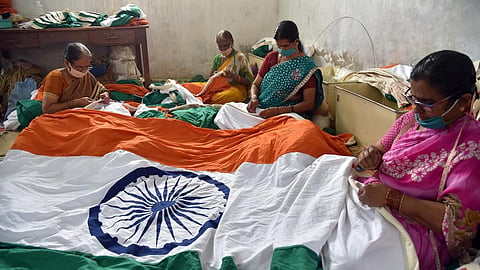Sonia bats for khadi as sole fabric for tricolour
New Delhi | Slamming the Modi government for the "rampant adoption" of machine-manufactured polyester flags, Congress leader Sonia Gandhi on Tuesday called for the restoration of khadi as the only fabric with the distinction of bearing the tricolour and asserted that the fabric must find its rightful place as an embodiment of national pride.
Penning an article in The Hindu, Gandhi said Prime Minister Narendra Modi's renewed call for a 'Har Ghar Tiranga' campaign in the week leading up to the Independence Day offers an opportunity to collectively introspect on the national flag and its significance to the country.
"His (Modi) moral duplicity in paying deference to the national flag while pledging allegiance to an organisation that has remained, indifferent to it, is one matter. The rampant adoption of machine-manufactured polyester flags, with raw materials often imported from China and elsewhere, is another," she said.
The Flag Code of India has historically required the national flag to be made of "hand spun and hand-woven wool/cotton/silk khadi bunting", she pointed out.
Khadi, that coarse but versatile and sturdy fabric which the Mahatma himself spun and wove in his leadership of the national movement, is imbued with a special meaning in our historical and cultural memory, she said.
Khadi is at once a symbol of our storied past, and an icon of Indian modernity and economic vitality, the Congress Parliamentary Party chief asserted.
It was in deference to this eternal symbolism that the tricolour once bore the Mahatma's charkha as its centrepiece, and that the modern-day Indian flag used to insist on khadi as its sole fabric, Gandhi said.
"In 2022, on the auspicious occasion of the 75th anniversary of our Independence, the Government amended the code ('vide its order dated 30.12.2021') to include 'machine made...polyester ... bunting' and simultaneously exempted polyester flags from the Goods and Services Tax (GST). Thereby, it put them on the same tax footing as khadi flags," she said.
At a time when it would have been appropriate to bind ourselves afresh to the service of our country's national symbols, the Government chose to set them aside and pursue mass-market, machine-made polyester fabric, Gandhi said.
She pointed out that the Karnataka Khadi Gramodyoga Samyukta Sangha (KKGSS) in Karnataka's Hubballi district, the country's sole national flag manufacturing unit accredited by the Bureau of Indian Standards (BIS), had to resort to an indefinite strike to call attention to the state-sponsored murder of India's khadi industry.
This decision came at a time when India, far from its glory days as a global hub for polyester manufacturing, became a net importer of polyester yarn in 2023 and 2024, she said.
"We thus have the real misfortune of importing polyester yarn, primarily from China, and then weaving this imported yarn to produce cloth for our national flag. This shameful inversion of our national pride occurred at the time of grave encroachments by the Chinese armed forces on our borders, and at the peak of the Prime Minister's 'Aatmanirbhar Bharat spectacle," Gandhi said, in a scathing attack at the Centre.
"The hollowness and inadequacy of the government's vision has had direct and calamitous consequences for the Mahatma's foremost legatees - our khadi spinners and weavers," she said.
The case of our national flag is not an exception, rather, it is a vividly poignant illustration of this government's general disinterest in cultivating India's storied handloom and handicraft traditions -khadi or otherwise, she said.
Since 2014, the government has led a consistent effort to support big corporate interests and oligopolisation, and structurally dismantle our nation's micro, small and medium enterprises sector, home to our handloom industries, the Congress leader said.
"Demonetisation, a punitive GST, and the unplanned COVID-19 lockdown saw thousands of our handloom workers quit their professions. Our handloom traditions, a material testament to our shared history as a society and polity, have been unravelled by the high-handedness of this uncaring government," she alleged.
The GST continues to be a burden on our handloom workers, with tax having been introduced on the final product as well as on raw materials such as yarns, dyes, and chemicals, she said.
"Our workers' consistent demands to exempt handlooms from GST have fallen on unsympathetic ears, even as surging costs, particularly of electricity and cotton fibre, squeeze them out," Gandhi said.
The recently launched Vishwakarma Yojana, itself deficient on multiple accounts, fully excludes handloom spinners and weavers from its ambit, she noted.
"Meanwhile, in a perversion of the Mahatma's vision, the Government has taken no effort to empower our khadi spinners and weavers to form their own cooperatives outside of existing khadi institutions to market and sell their product," she said.
Government procurement of khadi has fallen as departments choose to ignore or overrule mandates that require them to do so, she said.
"More worryingly, the government has failed to build a global audience for Indian handlooms. At a time when consumers across the world are beginning to prize sustainable sourcing and fair trade, the fabric on which Gandhiji's satyagraha was founded should have been globally treasured. Instead, even in his very own nation, Bapu's khadi is being denied its identity," she said.
The Government has failed to regulate the market and khadi spun from semi-mechanised charkhas is being sold indiscriminately, and under the same tag as traditional hand-spun khadi, Gandhi said in her article.
This is to the detriment of our khadi spinners, whose wages do not exceed Rs 200-Rs 250 a day despite their back-breaking manual labour, she said.


